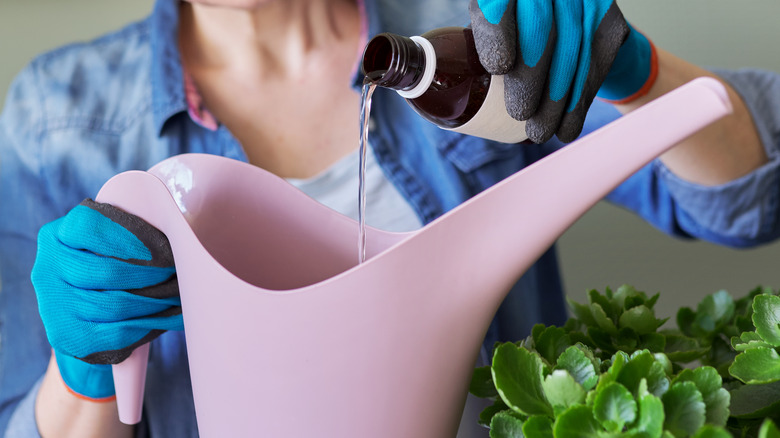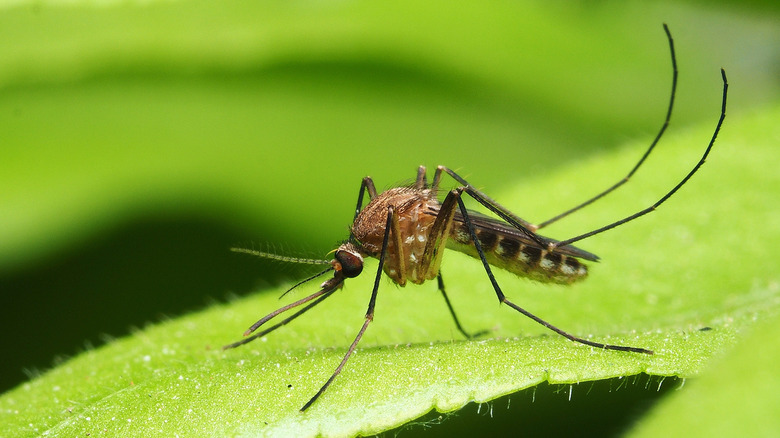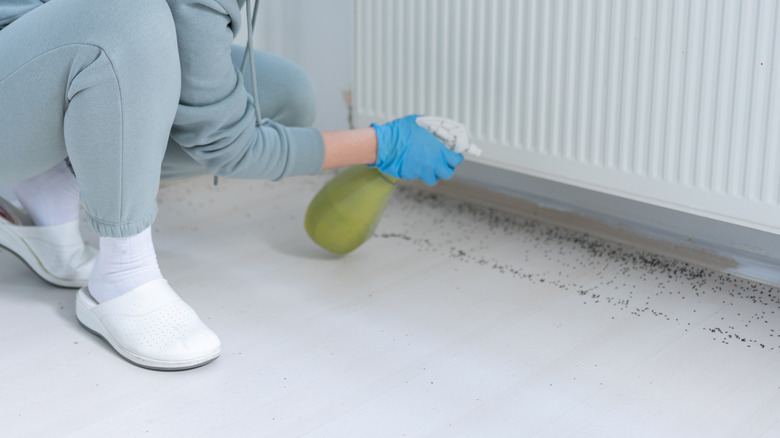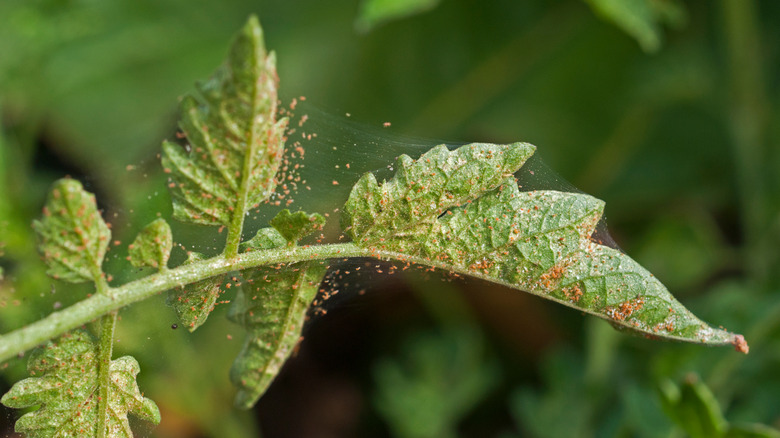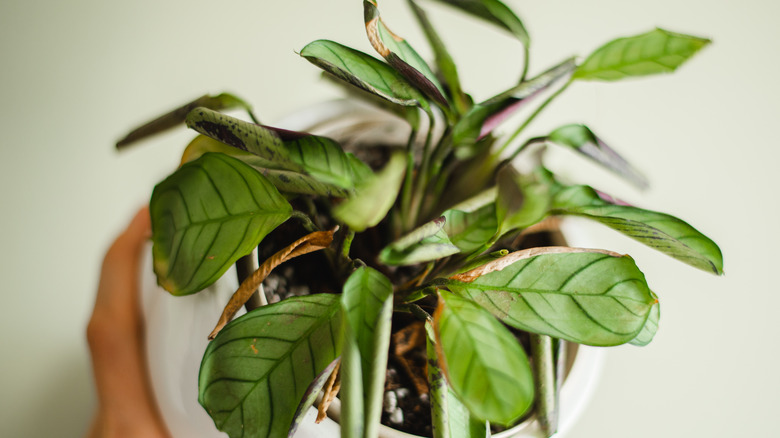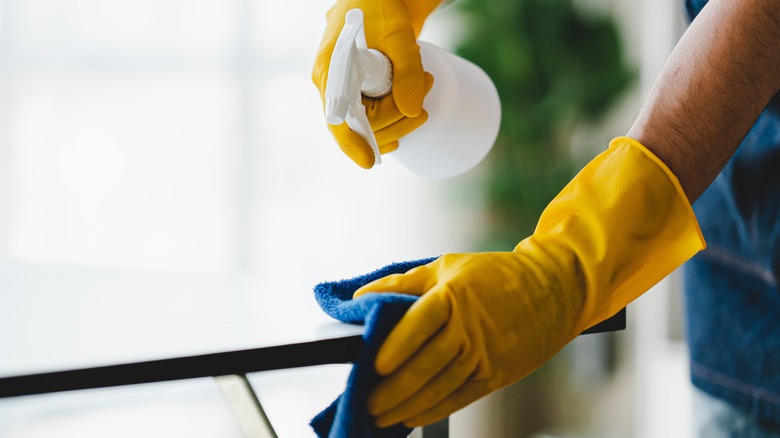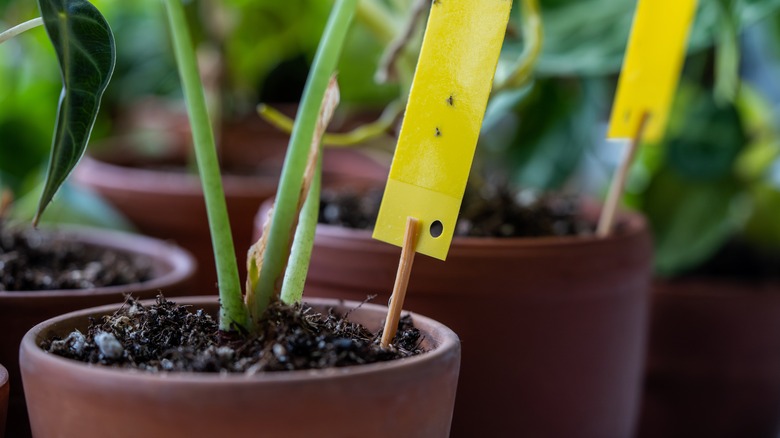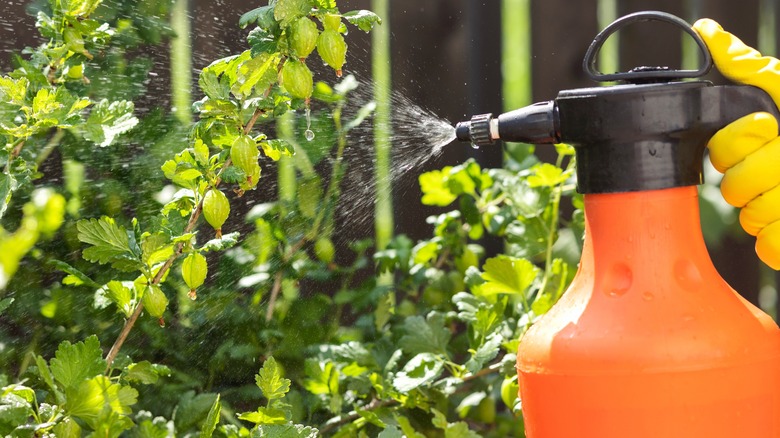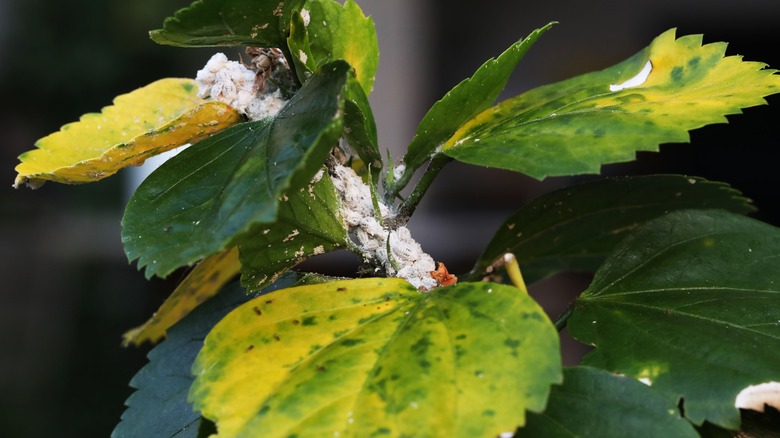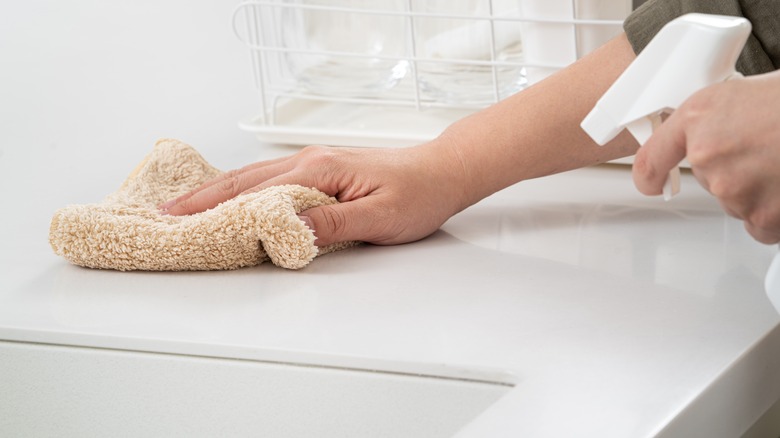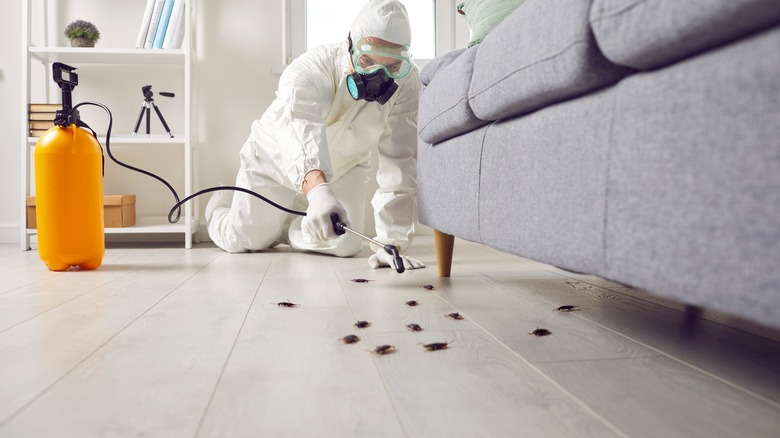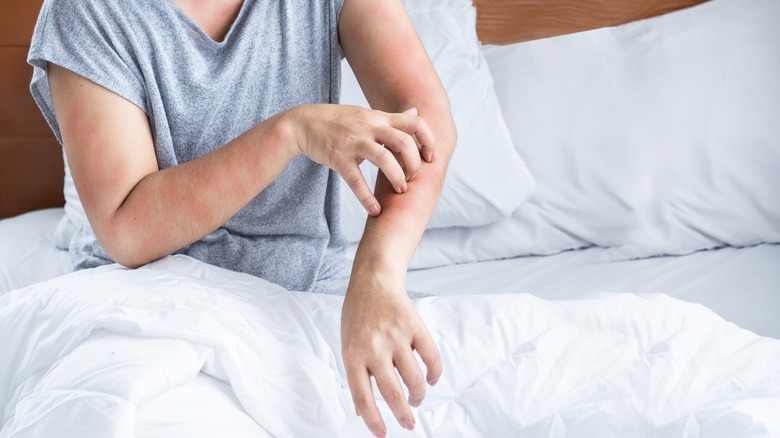8 Hydrogen Peroxide Pest Control Hacks To Try (& 3 To Avoid)
We may receive a commission on purchases made from links.
There are so many pests that commonly affect our homes and gardens which can easily be treated using household products like hydrogen peroxide. This cupboard staple might sound intimidating, but it's completely natural. Hydrogen peroxide is just water with extra oxygen molecules. While this product might be deemed 'natural', don't be fooled into thinking it's mild. This is a serious disinfectant and bleaching agent that can cause real damage when it isn't used with care.
When using hydrogen peroxide around the home to deter pests, eliminate infestations, and clean up after disease-spreading rodents, it's recommended that you use 3% hydrogen peroxide. This is the volume typically sold at the drugstore. It is heavily diluted and should be diluted further with water to make it safe for use around the home, while still representing a formidable force against pests. The benefits of using hydrogen peroxide against bugs and insects are numerous. It can save you from making the trip to the store for specific remedies because most people already have hydrogen peroxide at home. An added bonus? It's inexpensive. It will also prevent you from having to use chemical solutions around the house, which some families might prefer.
Keep mosquitos at bay with a hydrogen peroxide patio spray
Mosquitos can be a huge nuisance in warmer months, especially for anyone living close to a water source such as a lake or river where they tend to congregate. If you want to enjoy time out in your yard without the risk of getting bitten to shreds by these pesky pests, you can use a simple homemade spray using only two basic ingredients. Hydrogen peroxide diluted with water can be sprayed directly onto your patio area to deter mosquitos.
To make your own mosquito deterrent for the patio you'll need an empty spray bottle and some hydrogen peroxide. Fill the bottle with one-third hydrogen peroxide and two-thirds water. Be sure to use 3% hydrogen peroxide to avoid harming any nearby plants that might come into contact with the mixture. This can be sprayed on any hard surfaces around the patio where mosquitos tend to linger, such as benches, tables, and flooring. Take care when using the spray because it can also be harmful to other wildlife. If you have pets, it's best to avoid using this mosquito deterrent. Instead, you could deter mosquitos naturally with a fresh-smelling plant in your garden, such as lemon thyme or lemongrass.
Eliminate your ant problem with a DIY spray
Whether you have trails of these insects parading around your home or burrowing themselves into your plants, hydrogen peroxide is one of the best ways to get rid of ants. This common household disinfectant can be put to good use against ant infestations because it will kill the insects on contact. With a quick spray, you can quickly eliminate ants and then wipe them away to be disposed of.
To make a hydrogen peroxide solution to kill ants you'll need 35% food-grade hydrogen peroxide. This is a potent volume so be sure to dilute it down at a ratio of one part hydrogen peroxide to 11 parts water. Pour the mixture into a bottle with a spray nozzle and direct the liquid right onto any ants you can see in or around your home. A spray bottle that has the capacity to stream or mist, like these from Amazon, will be best. Use the stream function for more precision when spraying ants to minimize the risk of spraying nearby plants or lawns, which could be damaged by coming into contact with hydrogen peroxide.
Rid houseplants of spider mites with hydrogen peroxide
Spider mites are so tiny it can be difficult to see them with the naked eye. Their microscopic size makes them look like moving specs of dirt on the surface of foliage in shades of red, brown, or yellow. Despite their small stature, these puny pests can cause some seriously big problems for houseplant owners. They live on the underside of leaves, feeding on the sap of healthy greenery until it becomes discolored and weak. Fortunately, hydrogen peroxide rids plants of spider mites so you don't need to buy any special products to treat a spider mite infestation.
If you notice spider mites on your houseplants, get some regular 3% hydrogen peroxide from the drug store and dispense it into a spray bottle. Spray this directly onto the houseplant once a day for a week. Be sure to spray the undersides of the leaves and the surface of the soil where spider mites can hide. The peroxide will make an immediately noticeable effect on the existing spider mites, but it is unable to kill spider mite eggs. You may need to treat the plant with neem oil. Spider mite eggs are one of the common home and garden pests that neem oil can take care of.
Destroy thrips eggs in your houseplant soil
Thrips are tiny flying insects that look like dark flecks on the surface of a plant's foliage. Because they are so difficult to see, their infestation can become quite severe before the plant owner notices there's an issue. Thrips feed on the sap in the leaves, denying the plant of the moisture and nutrients it needs to thrive. Houseplants with a thrip problem might have unsightly patches of dead tissue on their leaves, or exhibit stunted growth. The key to eliminating thrips is stopping their life cycle before eggs are hatched, which you can do with hydrogen peroxide.
Thrips lay eggs in the soil of plants, so if you have a houseplant with a thrip problem you need to focus on treating the soil. Do this by filling a spray bottle with a mixture of 50% water and 50% hydrogen peroxide, then spray it liberally directly onto the soil, ensuring it is thoroughly soaked through the top inch. Repeat this once a week until all signs of thrips have gone. You can also spray the foliage of the plant with a hose to knock the adult thrips from the leaves. For outdoor plants, plant rosemary which repels thrips in the garden.
Deter pesky flies with hydrogen peroxide surface spray
Common types of flies that can become a nuisance in homes include fruit flies and house flies. You might notice that the number of flies around the house seems to increase during periods of hot weather, but if you spot more than a handful hanging around a particular area then you've probably got an infestation. Not only are flies a nuisance, they can also carry and spread diseases by landing on surfaces where we eat or where food is prepared. Unfortunately, despite house flies having a short lifespan, they can multiply rapidly, so it's important to treat a fly infestation before it gets out of control. Even better is to deter flies from setting up camp in your house in the first place, which you can do with the help of hydrogen peroxide.
To deter flies from landing on surfaces in your home, create your own surface cleaner that flies are repelled by. Mix one part hydrogen peroxide to two parts water in a spray bottle, then apply it to hard surfaces where flies typically land, such as your dining table and kitchen countertops. The hydrogen peroxide mix will simultaneously disinfect the surfaces to get rid of any bacteria previously left by flies, while also discouraging flies from landing there in the future. You can also help to keep flies out of your home with some handy plants, such as potted rosemary or lemongrass.
Banish fungus gnats with this common household product
Fungus gnats are truly a nightmare for any houseplant owner. They breed in the soil of the plant and feed on decaying plant matter. On young plants they can be disastrous, causing stunted growth and even death. On established plants, fungus gnats represent more of a nuisance than a health risk, but they can cause yellowing leaves and nutrient deficiency. For humans in the home, fungus gnats don't bite but they can carry disease.
A fungus gnat infestation multiplies rapidly and can quickly get out of control. These blighters can be incredibly difficult to get rid of, but fortunately, hydrogen peroxide works like a miracle cure. For a mild infestation, wait until the top few inches of soil has dried out, then water the plant with a mixture of 3% hydrogen peroxide and water at a ratio of one to four. This will kill all the eggs and larvae in the soil, stopping the gnat lifecycle. You'll need to repeat this for the next few plant waterings to prevent the infestation from reoccurring. The hydrogen peroxide is also beneficial to the root system of the plant you're treating because the extra oxygen molecules help to keep the roots aerated and promote healthy growth.
Exterminate an aphid infestation on your plants
Aphids are one of the most common pests to affect indoor plants. They pierce plant tissue and feed on the inner nutrients, causing weakened or stunted growth. These tiny insects prefer the underside of foliage and new shoots, leaving a sticky substance in their wake that is often the first thing a grower will spot. If you leave an aphid infestation untreated it will rapidly expand and could lead to the death of your plant. The aphids will also migrate to nearby plants and infect those, too. You can get an aphid infestation under control using some simple and chemical-free products you have around the home, such as hydrogen peroxide.
To treat an aphid infestation, first remove any leaves where severe damage has been caused, and where there is a heavy amount of live aphids present. Spray the remaining leaves with a mixture of three parts water to one part hydrogen peroxide. Be sure to spray underneath the leaves where aphids congregate. Use 3% hydrogen peroxide to ensure no damage is caused to the plant itself. You can also make a hydrogen peroxide mix to water the infected plants with, which will kill any aphids in the soil.
Stop the mealybug life cycle with a hydrogen peroxide soil soak
Anyone who's experienced a mealybug problem with their plants will know how infuriating these tiny monsters can be. These tiny, white, and fuzzy insects suck the sap from plants, depriving them of the essential moisture and nutrients they need to grow and thrive. They can be particularly difficult to get rid of, and some people find it easier to simply get rid of a plant than try to remove the mealybugs. One way to stop a mealybug lifecycle in its tracks is to target the eggs, which you can do with hydrogen peroxide.
For any plants that have a mealybug infestation, create your own soil soak which will kill off any eggs before they hatch, preventing generations of mealybugs from setting up a home on your houseplant. Use one part 3% hydrogen peroxide to four parts water, and apply directly to the soil of the plant once the top few inches have dried out. It's important to use 3% hydrogen peroxide to avoid damaging the plant roots. Do this every time you water your plant until the mealbugs have been eliminated. You can simultaneously attack the adult mealybugs with other household products. Get rid of the white bugs on your plants by wiping the leaves down and washing them with rubbing alcohol.
Hydrogen peroxide won't deter rats, but it can be used to clean up after them
Unless you're keeping these furry critters in your home as pets, rats are the last thing anyone wants to find in their house. These rodents carry fleas, ticks, and germs. Additionally, they can contaminate your food, aggravate allergies, and even cause fires by chewing through wiring. If you're looking for a trap-free way to get rid of these pests, hydrogen peroxide unfortunately is not the solution. Instead, you can try to rid your home of rats using peanut butter and bleach.
In tandem with catching, killing, and disposing of rats, you also need to keep on top of your cleaning regime. Since rats can infect anything they touch or leave droppings on, it's vital that you use a strong disinfectant to remove any trace of these rodents ever stepping their paws in your home. Use a homemade hydrogen peroxide spray using one part peroxide and three parts water to wipe down your hard surfaces, such as countertops in your kitchen and bathroom, kitchen shelves, tile flooring, and ceramic sinks. If you've found rat urine in your home you'll notice it leaves a nasty, lingering smell. This can be treated with neat hydrogen peroxide. Apply the peroxide to the area and allow it to work for a few minutes before blotting it up.
Hydrogen peroxide is not your best defense against roaches
Signs of a cockroach pest infestation in your home include droppings on the floor that look like coffee grounds, a musty smell, smears on the walls, and an increase in allergy symptoms. It's fair to say anyone who notices a roach problem in their home is going to want to tackle it immediately. But can hydrogen peroxide kill roaches and hard-shelled pests? Unfortunately, it's unlikely. There are suggestions by some users on TikTok that hydrogen peroxide can destroy these unpleasant creatures, but the evidence is only anecdotal. To get rid of cockroaches once and for all you'll want to stick with a method that is more tried and tested.
To get rid of unwanted roaches using household products, you can try a combination of baking soda and onion. The aim here is to get the cockroaches to ingest baking soda while eating the onion, which will then swell in their stomach and cause them to burst. You could also use boric acid powder to eliminate roaches in the home, or try the vaseline jar trap hack. However, for a surefire way to banish these blighters, you'll want to bring in the experts. The best roach pest control method is to call the pros.
Bed bugs can be killed with hydrogen peroxide, but there are better alternatives
Dead giveaways that your have a bed bug pest infestation include itchy bite marks on your skin, spots of blood on your bed sheets, and small brown smears on bedding. Undoubtedly you won't be keen on the idea of sharing your bed with these biting bugs, but many people aren't a fan of using chemical treatments in the area where they spend so much time sleeping. Hydrogen peroxide is a natural method for treating a bed bug infestation, but it isn't the best. You can spray a mixture of hydrogen peroxide and water directly onto your sheets and this should kill bed bugs on contact. However, hydrogen peroxide can stain or bleach sheets and mattresses, whereas there are some more effective alternatives that are kinder to your linens.
There are a number of myths about killing bed bugs that just don't work, so be wary of these so-called hacks to avoid wasting your time and allowing the infestation to grow. Foolproof ways to get rid of bed bugs include spraying your bed sheets with rubbing alcohol and then putting them in the washing machine on the hottest cycle, vacuuming your mattress and following it up with a steam cleaner, and applying diatomaceous earth to any surfaces bed bugs are inhabiting.
